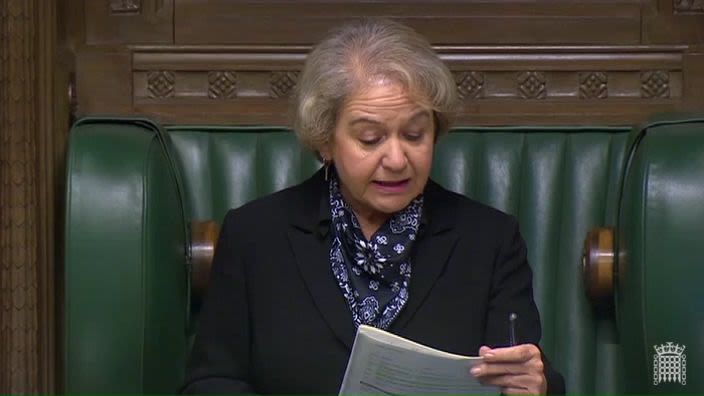Long covid
How your experiences of the condition contributed to a Parliamentary debate

What is long covid?
According to NHS England: “Emerging evidence and patient testimony is showing a growing number of people who contract COVID-19 cannot shake off the effects of the virus months after initially falling ill.”
“Symptoms are wide-ranging and fluctuating, and can include breathlessness, chronic fatigue, 'brain fog', anxiety and stress. The long term effects of the illness can be debilitating, even for young, fit people, or those who did not go to hospital when they had COVID-19 symptoms initially.”
Ahead of a Parliamentary debate on long covid, over 1600 people shared their experiences of the condition, describing how it had affected their health and everyday lives.
UPDATE 2: The debate is being livestreamed here: https://www.facebook.com/UKHouseofCommons/videos/3556701894440876...
Posted by UK House of Commons on Thursday, 7 January 2021
“Returning to any kind of normality feels very distant for me now. I used to be a productive member of society with a future and a daily life that was full. Now I can barely get out of bed in the morning and look after myself.”
These were passed on to the MPs leading and co-sponsoring the debate: Layla Moran, Dr Dan Poulter and Andrew Gwynne.

Your experiences reflected in the debate

There were several common themes which emerged from the contributions:
- Many described how symptoms limited their ability to take care of themselves and complete basic tasks.
“I struggled to get to work in the mornings as it seemed to take forever for my body to wake up. I would often have to pull over when driving as I couldn't keep my eyes open. The constant pain in my chest was tiring, as was the radiating pain I would get in my right arm. The brain fog became hideous - I would lose words, train of thought and forget things. Typing and completing computer documents or tasks was such a strain and this had never been an issue for me. It felt as if I was losing my mind.”
Andrew Gwynne MP had a similar personal experience:
- Many described suffering mental health issues resulting from the condition, including anxieties about the future and prospects of recovery.
"I am suffering from depression and a brain fog that means I cannot remember the smallest of things even what I am doing at that moment. I have no concentration and cannot follow a book or tv program. At the moment I am so depressed and feel that I have no joy in my life and only existing. There has been no help from any medical profession except 'There is nothing we can do'."
Dr Dan Poulter MP discussed the impact of the condition on mental health:
- Many reported issues with diagnosis and treatment due to a lack of medical understanding about the condition.
“So far, I have had multiple CT and MRI scans, been admitted to A&E following routine blood tests, yet the only thing the clinicians and doctors can agree on is that I am suffering from chronic fatigue. To date, I am yet to be referred to a long covid centre. I feel helpless and am conscious of being a burden to the health service due to being passed from pillar to post.”
Layla Moran MP spoke on this subject:
- Many feared how the condition had affected their children and family life:
“My son has missed an entire half term during his first term in secondary school. Missed out on academic study and forming friendships. He's gone from being a feisty, bubbly, intelligent older child to a pale shadow who forgot how to spell his own name. He is frightened of returning to school (even virtual lessons) knowing he'll be unable to keep up.”
Andrew Gwynne MP noted how support groups are highlighting the impact on children:
Many other MPs spoke during the debate, sharing their constituents' experiences and discussing the Government's strategy.
- Read a full transcript of the debate on Hansard
- Watch it on Facebook or Parliamentlive.tv
The Government’s response

Health Minister Nadine Dorries responded to the debate, and discussed the steps being taken to improve understanding, diagnosis and treatment of long covid, including:
- The launch of 'Your Covid Recovery’ in 2020
- Plans to open a further 12 centres to assess and diagnose people experiencing long-term health effects from covid in early 2021
- Investment in research on the long-term impacts of the condition on both hospitalised and non-hospitalised patients
- Creation of an NHS long covid taskforce which is working to produce information and support material for patients and healthcare professionals.
Thank you

Following the debate, Layla Moran and Andrew Gwynne gave these quick updates to contributors:
Many thanks to everyone who shared their experiences and stories for this debate.
- Read a full transcript of the debate on Hansard.
- Watch it on Facebook or Parliamentlive.tv.
- Read a House of Commons library briefing on long covid which was prepared for the debate.
Get involved

MPs often ask for public contributions to their debates through the House of Commons social media channels, or online forums:
Upcoming debates
You can also see what debates are scheduled on the House of Commons calendar.
If a debate topic is of interest to you, contact your MP, tell them about your experience, and ask them to attend.
You can watch all debates on parliamentlive.tv.
Education resources
Visit our learning pages for award-winning free education services for schools, colleges, communities and home educators.
Your UK Parliament newsletter
Sign up for a regular newsletter packed with the latest info on free activities online and around the UK to help you get involved and make a difference.
Visit Parliament
Parliament is currently closed to visitors due to the Covid-19 pandemic, but you can still attend a tour or a talk virtually – visit our online talks and events page for more information.
More stories like this
- Endometriosis in the workplace
- Mumsnet in the House of Commons
- Improving protections for retail workers
Was this story interesting? Please give us feedback.
